
Shared Resources provides access to technologies, services, and consultation that facilitate scientific interaction and enhance scientific productivity. These resources support the research efforts of the Fred Hutch/University of Washington/Seattle Children's Cancer Consortium, providing services that advance cancer research. For information on an individual resource and a complete description of services, expand the individual resource below.
ON THIS PAGE
CCSG-Supported Shared Resources | Other Shared Resources and Scientific Support
The Biostatistics Shared Resource (BSR) provides biostatistical support to members of every program – from basic to population to clinical sciences – throughout the entirety of the research process, both within and outside the context of research trials. Our ultimate goal is to support impactful cancer research through long-term, ongoing collaboration between researchers and biostatisticians. The BSR is intended to be used as a resource for Consortium members who do not have dedicated funding for biostatistical support.
For more information, visit our web page.
The Cellular Imaging and Electron Microscopy Shared Resources (CI&EMSR) provide cutting-edge imaging services and image analysis expertise. Our goal is to eliminate the barrier that microscopy and other forms of imaging technology can pose to researchers, allowing them to focus exclusively on their work. We work with scientists on an individual basis to develop approaches and techniques that are tailored to their specific needs and provide access to specialized equipment that may not be available otherwise. Cellular Imaging and Electron Microscopy are available to help researchers with every aspect of the imaging process, from sample preparation to imaging to analysis, and their staff are also happy to provide researchers with individualized training on microscopy techniques.
For more information, visit our web page.
Work with Us:
- To inquire about Cellular Imaging services and schedule a preliminary meeting to discuss feasibility and exchange information, please contact imaging@fredhutch.org.
- To inquire about Electron Microscopy services and schedule a preliminary meeting to discuss feasibility and exchange information, or coordinate sample drop off, please contact emsr@fredhutch.org.
Logistics and Access Details:
- Cellular Imaging
- Cellular Imaging equipment may be used in assisted sessions with staff or independently after requisite training session.
- Training sessions and assisted use sessions may scheduled via email.
- Independent use sessions may be scheduled via iLab.
- Staff hours are Monday-Friday, 9:00am-5:00pm. After-hours access is permitted for users who have completed requisite training and have a Fred Hutch ID.
- Electron Microscopy
- To submit service requests, reserve equipment time, and schedule required training session, users must have an iLab account.
- Staff are available Monday-Friday, 9:00am-4:00pm. After-hours access is permitted for users who have completed the training and have a Fred Hutch ID.
The Collaborative Data Services Shared Resource supports Consortium members with the design, execution, and data management of their scientific studies. CDS is comprised of two units: Programming, Data Control, and Interviewing. Together, these cores assist researchers with fundamental infrastructural tasks such as programming, data entry and storage, and interviews with study participants (including follow-ups). Outside of these basic services, CDS staff are available to work with researchers from every program to develop customized methods and technologies for specialized projects, and to provide training and education to Consortium faculty and staff on data management, programming, and interviewing techniques. Priority for our services is given to Consortium faculty with peer-reviewed projects and junior faculty seeking peer-reviewed funding.
For more information, visit our web page.
The Comparative Medicine Shared Resource (CMSR) provides Cancer Consortium members with invaluable assistance in their preclinical research. Our team of veterinarians and skilled staff members supports researchers through comprehensive animal care and husbandry for our available species (including mice, rats, fish, hamsters, and guinea pigs). Additionally, we provide training and technical help for animal-related research and colony management activities, and consultation on animal model selection, experimental design, and IACUC protocol preparation and review. Comparative pathology, preclinical modeling and preclinical imaging services complete our comprehensive research capabilities. The Comparative Medicine Core is available to assist researchers through all steps of ethical animal use in research to ensure high quality and compassionate research.
For more information on Comparative Medicine, visit our web page or contact us at CM@fredhutch.org.
For more information on Preclinical Modeling, visit our web page or contact us at ecromwell@fredhutch.org.
For more information on Preclinical Imaging, visit our web page or contact us at preclinicalimaging@fredhutch.org.
Work with Us:
- Please email CM@fredhutch.org to schedule a meeting with Comparative Medicine staff to exchange information and discuss feasibility of the proposed project.
- To inquire about Preclinical Modeling services, contact ecromwell@fredhutch.org
- To inquire about Preclinical Imaging services, contact preclinicalimaging@fredhutch.org.
Logistics and Access Details:
- Access to the Comparative Medicine facilities requires the following:
- Completion of the Institutional Animal Care & Use Committee (IACUC) Training
- Completion of CM-approved training
- Background check
Additional details and access steps, including costs and PO requirement, will be provided after the feasibility meeting pending determination that the Comparative Medicine Core can support the study.
The Genomics & Bioinformatics shared resource provides comprehensive support to Consortium members throughout the process of preparing, sequencing, and analyzing genomic samples. Our Core has the requisite technology for services including (but not limited to) whole genome sequencing, whole exome sequencing, expression profiling, ribosome sequencing, and epigenomics services. In addition to these services, the Genomics & Bioinformatics Core is comprised of a team of skilled, knowledgeable scientists and bioinformaticians who are available to Consortium staff for pre- and post-sequencing consulting. Our staff are happy to assist with issues such as technology selection, experiment design, data generation, and analysis.
For more information on Genomics Services, visit our web page.
For more information on Bioinformatics Services, visit our web page.
Work with Us:
- To inquire about genomics services, schedule a consultation, or coordinate sample drop off, please contact genomics@fredhutch.org.
- To inquire about bioinformatics services, schedule a consultation, or coordinate sample drop off, please contact bioinformatics@fredhutch.org.
Together, the Immune Monitoring & Flow Cytometry shared resources assist Cancer Consortium researchers with identifying, quantifying, and analyzing immunologic responses in clinical trial settings. More specifically, our Immune Monitoring services including developing specialized tetramers and molecular assays for assessing and isolating antigen-specific T-cells, as well as measuring other cellular immune functions. Our Flow Cytometry services include a variety of cell analysis and cell sorting technologies. Our staff provide comprehensive support throughout the process, including experimental design, technical assistance, data evaluation, and interpretation.
For more information on Flow Cytometry services, visit our web page.
For more information on Immune Monitoring services, visit our web page.
Work with Us:
- To inquire about immune monitoring services or set up an iLab account, please contact jcao@fredhutch.org.
- To inquire about flow cytometry services, including training, assisted analysis, and cell sorting, please contact flowcytometry@fredhutch.org.
Logistics and Access Details:
- Immune Monitoring:
- To submit a service request, users will need an iLab account.
- Flow Cytometry:
- To schedule time on an instrument, users will need an iLab account.
- Staff assistance is available Monday-Friday, 9:00am-4:30pm. After-hours access is available to trained users with a Fred Hutch ID.
The Prevention Center shared resource provides Consortium researchers with the equipment, staff support, and data assistance to be able to explore the effects of factors such as behavior, lifestyle, nutrition, and obesity on cancer. The Prevention Center is comprised of three main components:
- The Research Clinic is staffed by skilled medical personnel who provide clinical assessments, collect biospecimens, and obtain detailed anthropometry.
- The Exercise Research Center administers exercise training and testing and collects data such as VO2 max, spirometry, and indirect calorimetry.
- The Human Nutrition Laboratory helps researchers with diet design, food production and delivery, meal services, and participant managing for human feeding studies and behavioral or community nutrition intervention studies.
In addition to providing the facilities and technology necessary for these forms of research, the PCSR is staffed by well-trained staff and technicians who are available to support and train investigators according to the specific needs of their projects.
For more information, visit our web page.
The Proteomics & Metabolomics shared resource is dually comprised of the Proteomics Facility at Fred Hutch and the Metabolomics Facility at the University of Washington’s South Lake Union campus. Our goal is to provide researchers with the tools, services, and support needed to understand the protein- and metabolite-based mechanisms of cancer biology. In particular, our offerings include qualitative and quantitative analysis of proteins and metabolites, targeted proteomic and metabolomic assays, untargeted metabolomics and metabolic flux measurements, sample preparation, chromatography, and data analysis. For researchers with specialized needs, we are happy to provide consultation regarding experiment design, technology, and methodology.
For more information on Metabolomics services, visit our web page.
For more information on Proteomics services, visit our web page.
Work with Us:
- To inquire about proteomics and metabolomics services, contact pgafken@fredhutch.org.
The Recruitment & Retention Shared Resource (R&RSR) will aid the Consortium's efforts to increase health equity through community engagement and catchment area expansion. The R&RSR, which operates out of the Community Outreach & Engagement (COE) office, supports Consortium investigators in improving engagement with and recruitment of underrepresented and underserved populations in cancer research and clinical trials. R&RSR services will include:
- information and trainings on community-based participatory research best practices
- culturally and linguistically appropriate recruitment support
- community engagement support, including connections with community partners
- technical assistance such as in-person or telephone recruitment, in-person or virtual outreach/educational presentations, review and guidance for materials and digital media, evaluation of recruitment strategies, data collection tools, and catchment area data requests.
For more information about Recruitment & Retention services, visit the OCOE's website.
Work with Us:
- To schedule an initial consultation with Recruitment & Retention staff, please submit a request through this form.
The Research Pathology shared resource is comprised of a suite of three shared resources: Experimental Histopathology, Specialized Pathology, and Antibody Technology. Together, these teams provide Consortium members with comprehensive support from a team of knowledgeable and experienced staff. Services include, but are not limited to, high-density tissue microarrays, immunohistochemistry, slide-based assays, and monoclonal antibody discovery. Further, the Research Pathology Shared Resource is equipped with a plethora of cutting-edge technologies and methodologies, including over 500 antibody protocols and tissue microarrays of up to 100 cores. We assist researchers in every aspect of their pathological needs, from experiment design to image capture to analysis and interpretation, and are also willing to consult with researchers on project-specific needs and offer advice and training.
For more information about Experimental Histopathology services, visit our web page.
For more information about Specialized Pathology services, visit our web page.
For more information about Antibody Technology services, visit our web page.
Work with Us:
- To inquire about Antibody Technology services, please complete this form.
- To inquire about Experimental Histopathology services, please contact exphisto@fredhutch.org to exchange information, discuss feasibility of the project, and coordinate drop off.
- Once your project has received preliminary approval, please complete a service request form, including PO. These should be submitted with your samples at drop off.
Logistics and Details:
- Antibody Technology
- Prior to any work being started, a PO must be submitted.
- Once your project is approved, appropriate samples may be submitted via mail or dropped off at the Shared Resource. Please coordinate dropoff location, time, and date with the Shared Resource team beforehand.
- Final product, as available, will be returned to the research team.
- Experimental Histopathology
- Prior to any work being started, a PO must be submitted.
- Once your project is approved, appropriate samples may be submitted via mail or dropped off at the Shared Resource. Please coordinate dropoff location, time, and date with the Shared Resource team beforehand.
- Final product, as available, will be returned to the research team.
- Fred Hutch affiliates can access digital pathology images via VPN (HALO/HALO-link). Users without affiliate access can coordinate alternate methods for data transfer with staff.
The goal of the Therapeutic Manufacturing shared resource is to provide cell therapy products that Consortium members need to do their research. The clinical manufacturing services we provide are often crucial for conducting Phase I and II clinical studies, allowing cancer research treatments to transition from the lab to the clinic. Our products are all manufactured in accordance with current Good Manufacturing Practice (cGMP) and FDA guidelines.
Most of our products are for T-cell therapies, specifically chimeric antigen receptor (CAR) and T-cell receptor (TCR) therapies. Other available products and services include the following:
- In vitro gene therapies
- Natural killer cell treatments
- Culture of TM-LCL cells
- Preparation of tumor fragments (tumor-infiltrating lymphocytes)
- Expansion of hematopoietic stem/progenitor cells
- Formulation of final products for infusion
For more information on our Cell Processing services, visit our web page.
Work with Us:
- To inquire about Therapeutic Manufacturing services, or to schedule a tour of the Cell Processing facilities, please contact tppteam@fredhutch.org or Zita Mears (zmears@fredhutch.org).
The Translational BioImaging shared resource provides vital imaging equipment, support, and expertise to Cancer Consortium members. This shared resource is comprised of the Fred Hutch Preclinical Imaging Center, UW Radiology Imaging Cores, and additional UW Imaging resources. These facilities complement one another in meeting all of researchers' in vivo imaging needs. Between them, the two centers supply access to a wide range of imaging equipment, including magnetic resonance imaging (MRI), micro-computed tomography (micro-CT), micro positron emission tomography (PET), multiphoton microscopy, high resolution ultrasound (US), and IVIS spectrum systems. In addition to providing access to technology that might otherwise be prohibitively expensive for individual researchers, the TBICSR offers consultations, assistance, and optimization of imaging resources in alignment with each researcher's specific needs.
For more information on Translational Bioimaging services, visit our website.
Work with Us:
- For questions or to inquire about Translational Bioservices, contact Darshini Vijayakumar (dvijay26@uw.edu) or Fred Hutch Preclinical Imaging (preclinicalimaging@fredhutch.org).
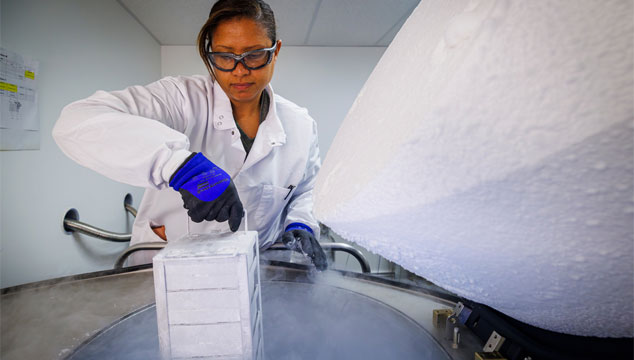
Biospecimen Processing & Biorepository
For more information about Biospecimen Processing & Biorepository services, visit our web page.
Work with Us:
- To inquire about services, please contact the lab at bpb@fredhutch.org.
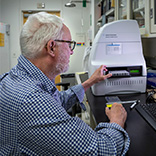
Cellular Bioenergetics
For more information about the Cellular Bioenergetics shared resource, visit our web page.
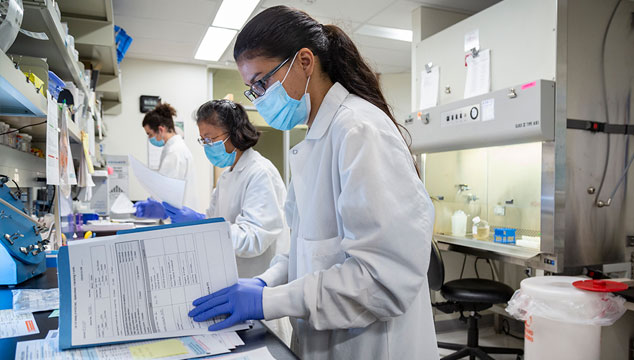
Clinical Research Specimen Processing
For more information about Clinical Research Specimen Processing services, visit our web page.
Work with Us:
- To inquire about services, please contact the lab at processing@fredhutch.org.
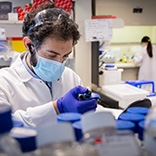
Co-Operative Center for Excellence in Hematology
The CCEH provides several different services to investigators, including:
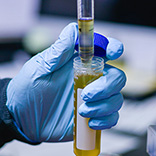
Molecular Design & Therapeutics
For more information about Molecular Design and Therapeutics services, visit our web page.